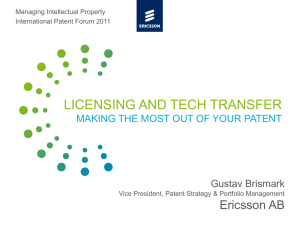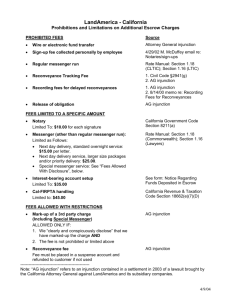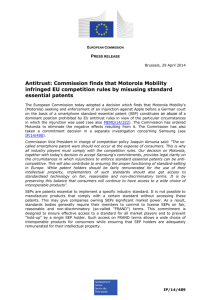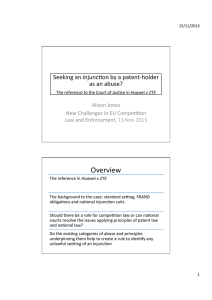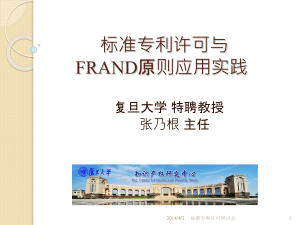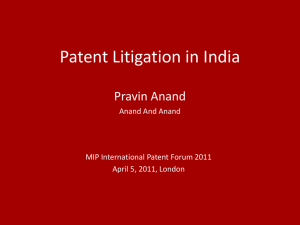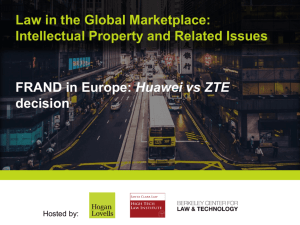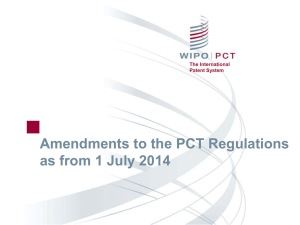Prof. Jones` Slides
advertisement
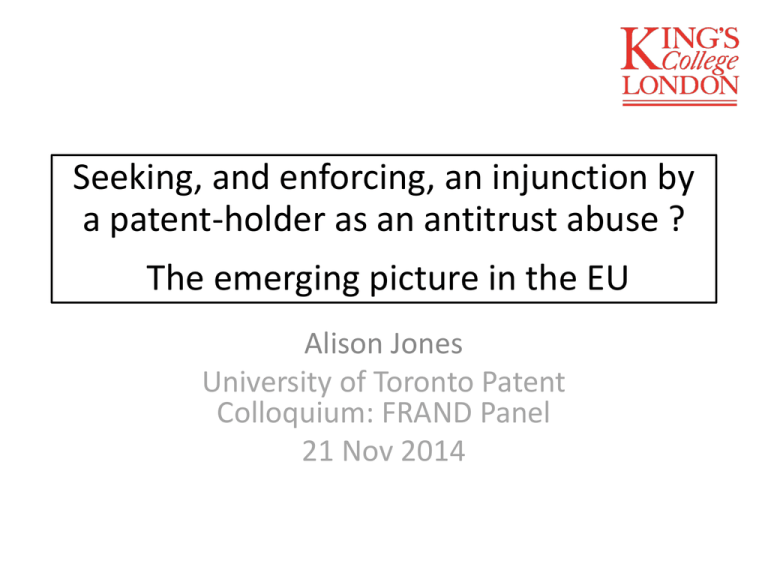
Seeking, and enforcing, an injunction by a patent-holder as an antitrust abuse ? The emerging picture in the EU Alison Jones University of Toronto Patent Colloquium: FRAND Panel 21 Nov 2014 Background Standard setting, standard-essential patents (‘SEP’) and Fair, Reasonable and Non-Discriminatory (‘FRAND’) licensing commitments Multiple national injunction suits in the EU Samsung, Motorola, Huawei and the concept of an abuse The Commission’s approach in Motorola The problem that has occurred in the EU Many national courts exercised discretion on facts to deny injunction to a FRAND-encumbered SEP-holder • Growing consensus that injunctions should be remedy of last resort? But the approach of German courts has been different: the Orange Book Standard • Attractive forum for patent holders – patent litigation can be resolved quickly and cheaply in patent-holder friendly way • German law ordinarily requires the grant of an injunction even before validity of the patent established: to avoid potential licensee must e.g., renounce defences and unconditionally offer terms, refusal of which would be abusive • Largest smartphone market in the EU. Implications for licensing throughout the EU – leverage for negotiating EU wide licences Should ‘antitrust’ intervene? If SEPholder entitled to injunction (virtually) as of right: Implementers (locked into a standard) have choice: exclusion or pay royalty demanded (but is it FRAND?) – Exploitation (beyond value of patent) and discrimination? It only takes one bullet to kill Allows exploitation of market power acquired as a result of the standard setting process (standard setting confers additional power beyond patent)? Royalty stacking? Undermines confidence in, and working of, SS process Adversely impact on innovation, quality, variety and cost of products downstream? These are the problems that, to ensure the success of the standard, the FRAND commitment was designed to prevent (and without FRAND the standard setting process itself may be anticompetitive)? If the FRAND commitment is powerless what about competition law? Goals of EU competition To ensure that competition in the internal market is not distorted: anticompetitive agreements/mergers and abuse of market power Like IP law it seeks to promote innovation and consumer welfare – but emphasis in Article 102 cases on protecting process of competition Sought to accommodate / understand nature of IPRs and to ensure that in order not to reduce dynamic competition and to maintain the incentive to innovate, innovators are not unduly restricted in the exploitation of IPR • Approach to technology transfer agreements • No assumption that holder of IPR is dominant Article 102 – can require dominant undertakings to deal with others or to deal on specified terms Article 102 prohibits abuse of a dominant position: includes exploitation and unlawful exclusionary behaviour (practices that cause consumers harm through their impact on competition - as distinct from competition on the merits), e.g., • Unfair pricing; Price discrimination; Refusal to deal; Margin Squeeze • Vexatious litigation; Or a new abuse – categories not fixed (eg AstraZeneca, misuse of patent system). Where dominant firm has no valid objective justification for its conduct In ‘exceptional circumstances’ exercise of IPR has been held to constitute an ‘abuse’; eg competition law encroaches on IPR by requiring holder to grant licences to third parties seeking to enter/remain on the market (Magill/ IMS/Microsoft) – but care: freedom of contract, impact on innovation European Commission Yes there is room for competition law Motorola Mobility Inc – infringement decision • Seeking an injunction can constitute an abuse in exceptional circumstances and absent any objective justification for the conduct • Disadvantageous licensing terms in the settlement agreements (especially no challenge clause to the validity of the SEPs etc) and a negative impact on, and undermining confidence in, the standard setting process (depriving consumers of its benefits) Samsung – commitments decision • Commitments to end Article 102 investigation Objections to antitrust intervention Runs against the very nature of the patent; injunction-legal remedy which part and parcel of patent Fundamental right of access to court (Art 6 ECHR) and general principle of rule of law – Courts can decide Breach of duty of sincere cooperation and mutual respect FRAND-encumbered SEP-holder not waived right to seek injunction Necessary to bring recalcitrant implementers who refusing to bargain in good faith (reverse hold-up) - denying access to injunctions gives prospective licensees enhanced ability/incentives to free-ride on SEPs If the non-innovators have to pay only little and late … it will mean that the profits of the grasshopper companies will be greater at the expense of the ant innovators, who made the grasshoppers’ business possible. And consumers will lose by reason of less future innovation. Professor Sir Robin Jacob Huawei v ZTE – litigation between two Chinese companies before the German courts Might lower German courts be in breach of obligations under EU law by making an injunction available? Essentially, the Landgericht Düsseldorf has asked the CJ whether, and if so when, the seeking of an injunction by a patent-holder against a patent infringer may constitute an abuse of a dominant position contrary to Article 102 The fact that an injunction is permitted under national law would not provide a defence to a finding of an abuse – conduct attributable to SEP-holder and not required Court of Justice to rule on the question of ‘abuse’ in Huawei (AG Opinion on 20 November) Unlawful exploitative conduct? Or Exclusionary? • Eliminating competition by “utilising methods other than those which come within the scope of competition on the merits”, AstraZenca? • If injunction permitted– significant risk of hold-up; no adverse impact on freedom of contract/ innovation – SEP-holder planned to monetise right through licensing • Anticompetitive effects? • Success of standard setting processes; Exclude competing technology upstream; Eliminate competition and development of competition in fast-moving market downstream? But what about right of access to court? SEP-holder can raise objective justification so implementers not free to infringe with impunity • potential licensee not willing to pay FRAND rate or cannot pay? If injunction not generally available to SEPholder Axiomatic that mechanism for swift resolution of licensing disputes put in place Role for competition agencies? Should SSOs be doing more Guidance necessary from courts in the EU – no direct precedent (but judgments in the US are emerging)
